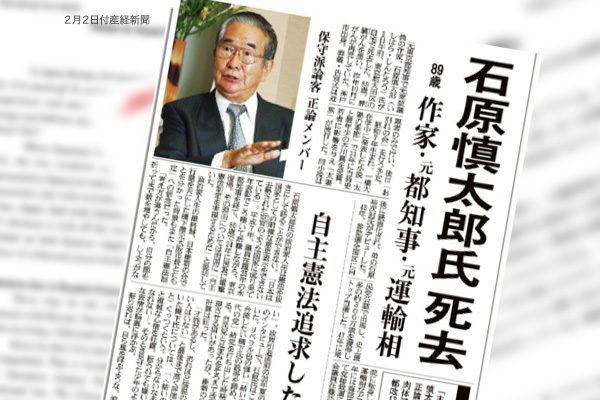I was startled when hearing the death of Shintaro Ishihara in a TV news program from 7 p.m. on February 1. This may be because the news came soon after I saw a video showing that Ishihara, who was of the same age as I and known for splendid literary and political career, recovered good health to enjoy jogging.
Contribution to energize JINF in its early days
Most importantly, our Japan Institute for National Fundamentals got a lot of assistance from Ishihara. It may have been in 2006 before the foundation of JINF when current JINF President Yoshiko Sakurai and I called on Ishihara at his office in the Tokyo Metropolitan City Hall in line with our fellows’ call for inviting the then Tokyo governor to become one of the JINF directors.
Sakurai carefully explained her thought about launching JINF and the content of a prospectus and requested Ishihara to assume the directorship at any cost. Although I was ready to receive some questions from him, he instantly accepted the request. “Some funds may be required for launching this kind of organization,” said Ishihara. “My door is always open.”
To be honest, neither Sakurai nor I had knowledge about procedures to launch a research institute. We could make a list of candidates for directors and councilors. We could ask some candidates easily by phone to assume the post. But other candidates were not suitable for our easy phone request. We were unaware of procedures for making official requests. As a journalist, you can have talks with anyone on an equal footing. But we could not do so in this case. However, Ishihara might have understood our feelings. In this way, Shintaro Ishihara had topped the list of directors in the first issue of our newsletter. Although his name has disappeared later due to the expiration of his term, he undoubtedly contributed to the advancement of JINF.
Hard punch to Japan-U.S. alliance believers
I make a quick digression. Literary critic Jun Eto won the Fuji Sankei Group’s Seiron Award in 1998 and had a talk for a newspaper with me as the winner of the previous year’s award. I told Eto at the talk that former U.S. Presidential National Security Adviser Zbigniew Brzezinski described Japan as the United States’ “de facto protectorate.” Surprised to hear it, Eto said, “Did Americans begin to say such a thing?” After the talk, Eto said he would like to read the original English text. I sent a copy to him.
Later, however, Ishihara began to write and say on TV that a mere presidential adviser described Japan as a footman. I was surprised and checked the English text again. I found no such word in it.
Eto and Ishihara were close. I guess that Eto angered by the Brzezinski description might have furiously told Ishihara by phone that a former U.S. senior official disgracefully treated Japan like a footman. I suspect that this might have led Ishihara to believe Brzezinski as having described Japan as a footman.
During the same period, Ishihara coauthored a book titled “The Japan That Can Say No,” which became a bestseller. The book packed a hard punch to those who automatically advocate an emphasis on the Japan-U.S. alliance. The book provided aggressive arguments that I admire. I personally argue that Japan should become strong before forming an alliance with the United States. In this sense, I share the direction with Ishihara. I pray for his happiness in the next world.
Tadae Takubo is Vice President, Japan Institute for National Fundamentals, and a professor emeritus at Kyorin University.


